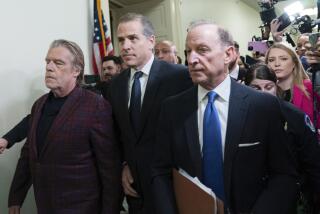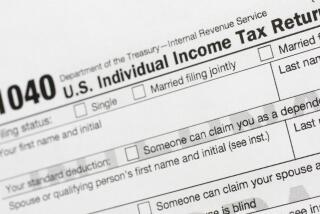At tax time, cases like Geithner’s raise pointed questions
The Treasury secretary, who oversees the IRS, initially didn’t pay all his taxes. Neither did five other top nominees for the Obama administration or their spouses. Now, as tonight’s tax deadline looms, some Americans are rhetorically asking: What would have happened to me if I had done the same thing?
The resentful reaction to such disclosures resonates not just among the anti-tax people organizing protests around the country today, but in low- and high-income neighborhoods of cities like Los Angeles -- and even in the hallways of the Internal Revenue Service.
The most criticized example of nominees with tax problems has been Treasury Secretary Timothy F. Geithner, who owed $34,000 in payroll and Social Security taxes from 2001 and 2002, and didn’t pay all of it until Obama nominated him. But five other nominees had similar tax issues -- as recently as two weeks ago, when Kathleen Sebelius, Obama’s pick to run Health and Human Services, admitted she had discovered she owed the Treasury $7,070 from 2005 to 2007.
“Our members are upset and angry,” said Colleen Kelley, president of the National Treasury Employees Union, referring to concern bubbling up inside the IRS over unusually strict rules that can cost IRS agents their jobs if they make a mistake, whereas Geithner and others are treated with relative leniency. In addition, the Geithner case is making the work of IRS compliance agents a bit harder, she said.
The biggest factor affecting tax compliance this year may be taxpayers’ inability to pay due to the poor economy, but the repeated problems of the Obama team adds another layer of complaint to the grumbling of taxpayers who are already feeling stretched, tax professionals said.
Robert Schriebman, a Rolling Hills Estates tax attorney, said his clients were seething over the tough treatment they get from the IRS compared with what happened to some in the president’s Cabinet.
A small concrete contractor who failed to make timely payments of payroll taxes asked how Geithner got away without paying his taxes for so long when the IRS is on his case every week, Schriebman recalled.
“Politically powerful people are less likely to get bothered by the IRS,” Schriebman said. “It is more than a question of fairness. Not only is the IRS looking away from confronting influential people; the IRS is getting a lot tougher and nastier toward the little guy.”
The current IRS commissioner, Doug Shulman, told reporters Monday that there is no discrimination when it comes to tax enforcement.
“The American people are pretty smart,” he said. “They understand that people who are nominated for high office are going to be put under a level of scrutiny. They also understand the tax code is incredibly complex.”
Lawrence B. Gibbs, IRS commissioner during the Reagan administration and now a tax attorney at Miller & Chevalier, said a small minority of taxpayers might see the tax issues of current nominees as a rationale to cheat.
“Some people are looking for an excuse,” Gibbs said. “Some people might make the jump to rationalize that because these others are doing it, they can do it too. That’s where the risk is.”
Geithner told a Senate hearing in February that his failure to pay $34,000 in Medicare and Social Security taxes between 2001 and 2004 was an oversight -- an embarrassing mistake. Kelley pointed out in an interview Tuesday that a similar “mistake” by one of Geithner’s subordinates at the IRS would probably result in swift termination.
In some cases, IRS employees have lost their jobs for simply filing a late return or failing to report a few hundred dollars of interest income.
“My issue is not that I want Geithner or anyone else punished,” Kelley said. “I want there to be a reexamination of the law that holds IRS employees to a separate standard -- one in which a simple mistake can cost them their jobs with no right of appeal.”
IRS compliance employees have reported recently that some taxpayers cite the Geithner case when they are asked to pay their tax bills. “It’s making the compliance conversation harder,” she said.
Royce Esters, a tax preparer in Compton, said this week that people in his low-income community have serious doubts about Geithner.
“They are saying that if he can’t figure out his taxes . . . , how can he be in charge of the Internal Revenue Service,” Esters said. “He owed $34,000, and he is running the Treasury? That’s ridiculous.”
Geithner’s $34,000 in unpaid taxes pales in comparison to the $128,000 belatedly paid by Tom Daschle, Obama’s first choice to run Health and Human Services. But Geithner’s position overseeing the IRS along with the circumstances of his tax problems make his case particularly galling.
When Geithner worked as a policy advisor for the International Monetary Fund, he didn’t pay Social Security or Medicare taxes on his income despite repeated reminders from the IMF to do so. After the IRS audited him in 2006 and discovered the errors, Geithner corrected his returns for 2003 and 2004. But he did not pay the taxes he owed for 2001 and 2002 until after Obama nominated him to be Treasury secretary.
Geithner told the committee that he prepared his own federal tax returns during the first two years he worked at the IMF, 2001 and 2002, using a computer program that did not flag any problems.
The explanation didn’t wear well with tax preparers interviewed this week.
“As a tax consultant, I can’t get away with [anything] like that,” said Esters, a member of the Compton Crime Commission. “I mean, the IRS would be on us like that.”
--
ralph.vartabedian@ latimes.com







